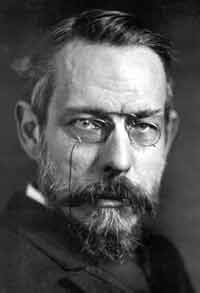Brander Matthews: Difference between revisions
infobox writer cleanup to new parameters using AWB |
fix typo, add out-of-copyright image |
||
| Line 1: | Line 1: | ||
[[Image:Brander_matthews.jpg|Matthews in middle age]] |
|||
{{Infobox writer <!-- for more information see [[:Template:Infobox writer]] --> |
{{Infobox writer <!-- for more information see [[:Template:Infobox writer]] --> |
||
| name = James Brander Matthews |
| name = James Brander Matthews |
||
| Line 25: | Line 28: | ||
{{wikisource author}} |
{{wikisource author}} |
||
'''James Brander Matthews''' (born [[February 21]], [[1852]] in [[New Orleans]]; died [[March 31]], [[1929]] in [[New York City]]), was a [[United States of America|U.S.]] [[writer]] and educator. Matthews was the first U.S. [[professor]] of [[dramatic literature]]. He graduated from [[Columbia College of Columbia University|Columbia College]] in [[1871]], where he was a member of [[St. Anthony Hall]], and from [[Columbia Law School]] in [[1873]], but turned to a literary career. From [[1892]] to [[1900]] he was professor of literature at [[Columbia University|Columbia]], and thereafter held the [[Chair (official)|chair]] of dramatic literature. His influence was such that a popular pun claimed that an entire generation had been " |
'''James Brander Matthews''' (born [[February 21]], [[1852]] in [[New Orleans]]; died [[March 31]], [[1929]] in [[New York City]]), was a [[United States of America|U.S.]] [[writer]] and educator. Matthews was the first U.S. [[professor]] of [[dramatic literature]]. He graduated from [[Columbia College of Columbia University|Columbia College]] in [[1871]], where he was a member of [[St. Anthony Hall]], and from [[Columbia Law School]] in [[1873]], but turned to a literary career. From [[1892]] to [[1900]] he was professor of literature at [[Columbia University|Columbia]], and thereafter held the [[Chair (official)|chair]] of dramatic literature. His influence was such that a popular pun claimed that an entire generation had been "brandered by the same Matthews". |
||
==Activities== |
==Activities== |
||
Revision as of 17:26, 12 April 2008
James Brander Matthews | |
|---|---|
| Occupation | Professor of Dramatic Literature |
| Nationality | USA |
James Brander Matthews (born February 21, 1852 in New Orleans; died March 31, 1929 in New York City), was a U.S. writer and educator. Matthews was the first U.S. professor of dramatic literature. He graduated from Columbia College in 1871, where he was a member of St. Anthony Hall, and from Columbia Law School in 1873, but turned to a literary career. From 1892 to 1900 he was professor of literature at Columbia, and thereafter held the chair of dramatic literature. His influence was such that a popular pun claimed that an entire generation had been "brandered by the same Matthews".
Activities
He was one of the founders of the Authors' Club and of the Players' Club, both of New York; one of the organizers of the American Copyright League; a member of the American Academy of Arts and Letters and president (1913) of the National Institute of Arts and Letters; the first chairman (1906) of the Simplified Spelling Board; and president of the Modern Language Association of America (1910). In 1907 the French government decorated him with the Legion of Honor.
Twain's criticism of
In his essay critiquing the fiction of James Fenimore Cooper, "Fenimore Cooper's Literary Offenses," Mark Twain criticizes Matthews' statements concerning the merits of Cooper's literary works.
Works
His works cover various topics and subjects.
- The Theatres of Paris (1880)
- French Dramatists of the Nineteenth Century (1881; revised in 1891 and 1901)
- Margery's Lovers (1884)
- Actors and Actresses of the United States and Great Britain (five volumes, 1886), with Laurence Hutton
- In the Vestibule Limited (1892)
- Americanisms and Briticisms (1892)
- The Decision of the Court (1893)
- Vignettes of Manhattan (1894)
- Studies of the Stage (1894)
- His Father's Son (1895), a novel
- Aspects of Fiction (1896; revised in 1902)
- An Introduction to the Study of American Literature (1896)
- Studies in Local Color (1898)
- A Confident To-Morrow (1900)
- The Action and the Word (1900)
- The Historical Novel and Other Essays (1901)
- Parts of Speech, Essays on English (1901)
- The Philosophy of the Short-Story (1901)
- The Development of the Drama (1903)
- The Short Story (1907)
- Americans of the Future and Other Essays (1909)
- Molière: His Life and Works (1910)
- Introduction to the Study of American literature (1911)
- Shakespeare as a Playwright (1913)
- On Acting (1914)
- The Oxford Book of American Essays (1914)
- These Many Years (1917), his autobiography
- Principles of Playmaking (1919)
- Playwrights on Playmaking (1923)
This article incorporates text from a publication now in the public domain: Gilman, D. C.; Peck, H. T.; Colby, F. M., eds. (1905). New International Encyclopedia (1st ed.). New York: Dodd, Mead. {{cite encyclopedia}}: Missing or empty |title= (help)
Further reading
- Ashton, Susanna M. (2000). "Authorial Affiliations, Brander Matthews in Partnership". Symploke: A Journal of Comparative Theory and Literature. 7 (1–2).
{{cite journal}}: External link in|journal=

